News
Stay updated with the latest from Volunteering New Zealand

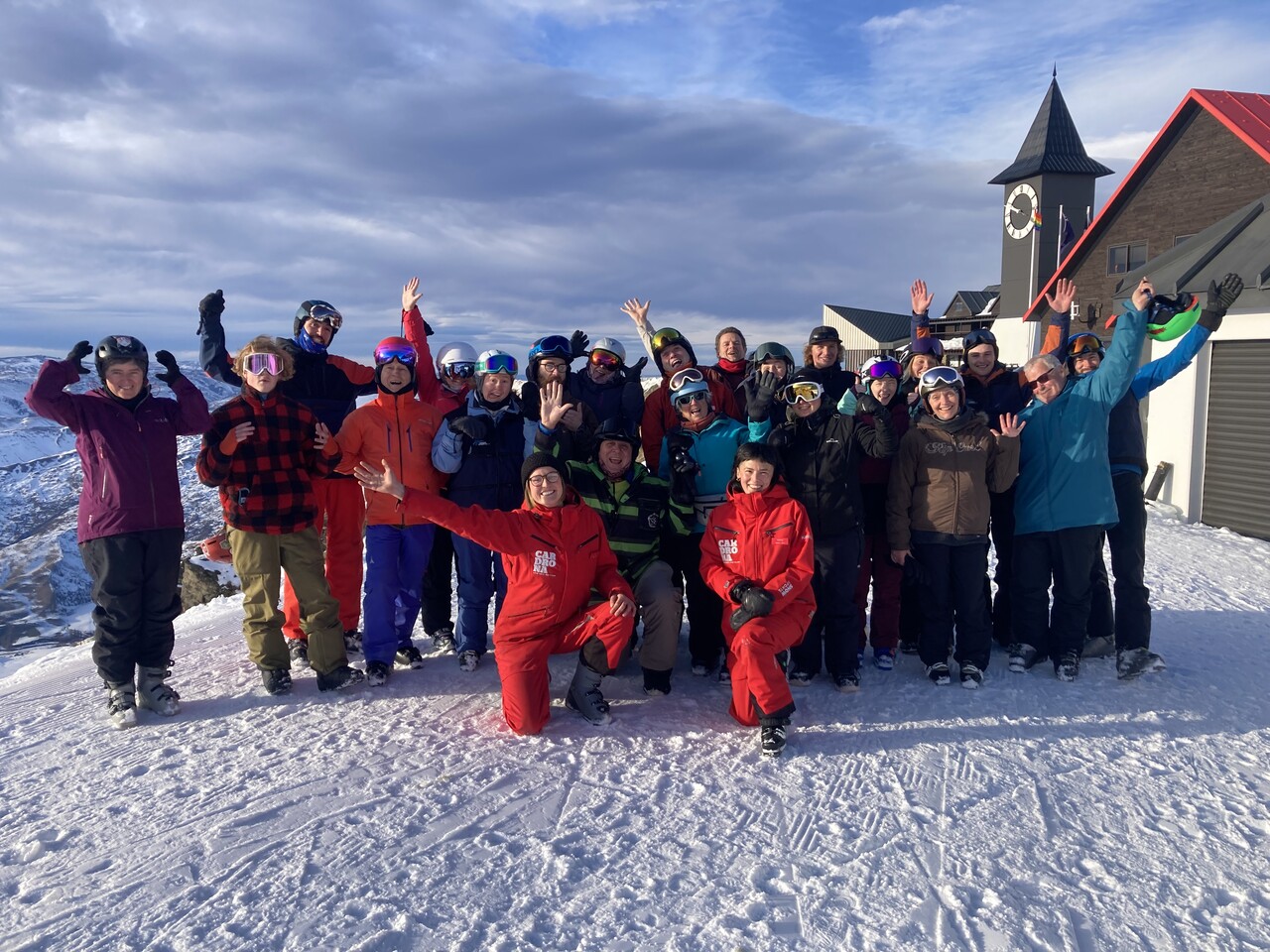
Accessibility
Inclusion
Sports
Volunteers
Sharing a passion for snow sports

Every winter season volunteers help to run the Cardrona Adaptive Snow Sports Programme at Cardrona and Treble Cone Alpine Resorts by supporting guests and sharing a passion for snow sports.
The programme caters for people with various physical, cognitive and sensory abilities.
The goal is to make snow sports accessible for everyone.
Volunteers support guests, facilitate and provide a safe environment, so everyone can enjoy the snow and the mountain.
This could mean assisting in a lesson or just skiing or riding with someone who needs a second pair of hands to be able to access the mountain.
"Without volunteers, we would not be able to run the programme," says Kat Mueller.
With more than 350 sessions being delivered by volunteers in winter 2022, the programme has seen one of its busiest seasons ever.
This was a great team effort, however, we’d like to highlight and recognise a few of our volunteers who have gone above and beyond with their commitment to help": Tomas Cervenka is one of our longstanding volunteers who has volunteered with the Adaptive Programme since 2019.
His calm manner and excellence in bucketing and tethering are highly appreciated by his guests.
Last season, he volunteered 31 times. Julian Warren loves sharing his passion for snowboarding with our adaptive guests.
He volunteered 30 days last season, which included a lot of guiding visual impaired skiers.
Since Lois Martin has retired from being a physiotherapist she has dedicated her time to volunteer for the Adaptive Programme.
Lois spent 27 days assisting especially guests with cognitive impairments enjoy the snow and the mountain. Murray Walker is new to volunteering with the Adaptive Programme, but in no way new to skiing.
He is an avid skier who helps out in any way he can, on snow and off snow.
He helped 18 days last season.
Local Alison Jarvis has been a huge help volunteering for 18 days.
Her caring and kind personality are well regarded by our adaptive guests and Ali’s ability to help across all disciplines have made her an integral part of the team.
For enquiries contact Kat at adaptive@cardrona.com

Community
Volunteers
One Mother to Another volunteers – SHOUT OUT!

Volunteers are the lifeblood of One Mother to Another.
In the past year, 123 people have generously donated their time, skills and expertise to help us provide thousands of care packages for parents and whānau (primarily mothers) in hospital with their sick child/ baby.Whether it be writing handwritten notes of encouragement, flexing muscles at a packing day, skilfully crocheting hearts, knitting blankets or donating their business nous and big picture thinking around the board table, our volunteers have gifted more than 2500 hours to the organisation in the past year alone.There are so many skills reflected in our volunteer community and we need and appreciate every one of them.We also know that our volunteers love being part of One Mother to Another’s story too.
Many are past recipients of our care packages, or know someone who received one and now want to help others who are in that same vulnerable position.
For many of our volunteers, being able to pay-it-forward allows them to write a second chapter to their hospital journey and turn a difficult experience into a positive one.One volunteer Sally knows what it’s like to have a newborn in hospital and now as a grandmother, that empathy spurred her on to become an essential part of our note-writing and packing teams.She says, “The terror of adjusting to parenthood with a sick baby is never forgotten.
It’s about lots of people doing a little bit to make a huge difference to families with sick babies and children in hospital.”Another volunteer, Catherine, says she is involved with One Mother to Another because “even though I can’t be there to hold their hand, I can help by giving them something truly special to show those parents that they are loved and supported.”Our volunteers are so selfless and make a tangible difference to the life of a stranger in one of the most difficult seasons of their life.A big shout-out to our following teams:Our note writersWe are so incredibly thankful to have dozens of people write handwritten notes of encouragement each month.
So often we hear from care pack recipients how much the handwritten note inspired them and how it helped them not to feel alone.
An extra big thanks to Fiona who coordinates the team of superstar note writers.
She and her team are incredible.Our packersEvery month a truly amazing team come together to pack hundreds of care packages, in the last year the team have packed an incredible 5,000 care packs!!Our crochet and knitting teamThese needle-masters put so much love into making crochet hearts for the parents in hospital and creating beautiful blankets to be given out to children needing some warmth.
Every stitch is made with so much love!Our boardOne Mother to Another is lucky to have leaders in their respective fields serve as board members in a volunteer capacity.
Their collective wisdom and passion is helping propel us forward so we can have the best impact in a moment of need.To every One Mother to Another volunteer, we want to say thank you!
Every hour is greatly appreciated and we just want to say, “we see your efforts and greatly applaud them.
You are helping to make a difference in someone’s darkest hours!”
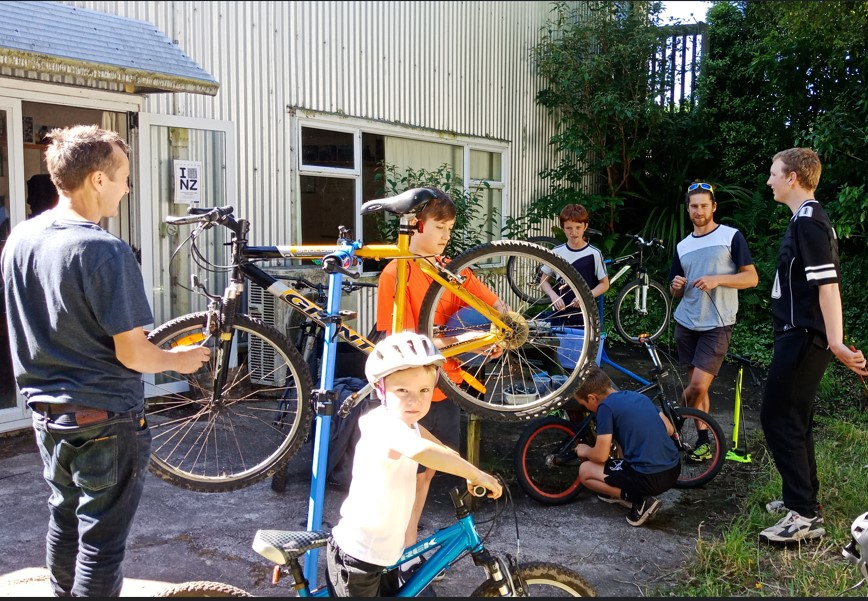
Community
Recognition
Youth
Big Shout Out Southern Youth Development bike repairers

Southern Youth Development is a passionate supporter of empowering youngpeople, especially with mahi hapori that encourages sustainability and bettersystems for our environment.
Our youth workers and volunteers support rakatahi tocollect bicycles from the landfill to restore, recycle and give them back out to peoplewho need them.Our volunteers are mentors who facilitate rakatahi to gain lifelong skills by learninghow to maintain and care for a bicycle.
They teach everything through learning howto use tools, maintaining and understanding the mechanisms of a bicycle and thenencourage rakatahi to make connections with the community by gifting the bicyclesto people who need them.
Our volunteers are often rakatahi who have gone throughthe programme themselves and want to share their knowledge.The Bikes@syd programme has been running since 2018 and our team of youthworkers and volunteers have supported rakatahi to recycle over 2000 bicycles in thistime.
Recycled bicycles go to whānau in need, or those who need to use bicycles forcommuting, but anyone from the public can receive the bicycles and the sydvolunteers often have their own strong links in the community.
Since the beginning ofthe programme, syd has been gifting bicycles to newly arrived former refugeewhānau in their first few weeks in Ōtepoti Dunedin.
Both volunteers and rakatahigenerally maintain strong relationships with many of those who receive theirbicycles.Southern Youth Development is extremely grateful to all the volunteers who supportbikes@syd and all their youth programmes.
Their expertise, so freely given, is animportant part of all the mahi we do for both our rakatahi and our hapori.

Community
Conservation
Recognition
Shout Out to the Amazing Volunteers of Sanctuary Mountain Maungatautari!

We want to take a moment to recognize and express our deepest gratitude to theincredible volunteers of Sanctuary Mountain Maungatautari.
Your unwaveringdedication and tireless efforts have made a profound impact on the preservation andrestoration of this remarkable sanctuary.To the hardworking Admin team, thank you for your behind-the-scenes support,organizing logistics, and ensuring smooth operations.
Your administrative skills arecrucial in keeping everything running smoothly.To the passionate Aviary team, your commitment to caring for the birds and providingthem a safe haven is truly inspiring.
Your knowledge and nurturing efforts helpprotect the diverse avian species that call this sanctuary home.To the dedicated members of the Cambridge Market Stall team, your presence atlocal markets spreads awareness about Sanctuary Mountain Maungatautari andhelps generate much-needed support.
Your dedication to educating the communityabout conservation is invaluable.To the Custodians, your role in maintaining and protecting the sanctuary's uniquebiodiversity is commendable.
Your hard work ensures that the natural habitats thriveand continue to provide a refuge for countless plant and animal species.To the enthusiastic Events team, thank you for organizing engaging activities andevents that connect people with nature.
Your efforts foster a sense of community andappreciation for the sanctuary's incredible ecosystem.To the passionate Gofa team, your commitment to eradicating pests and invasivespecies is essential for the long-term sustainability of Sanctuary MountainMaungatautari.
Your work plays a vital role in maintaining the delicate ecologicalbalance.To the dedicated Kiwi team, your tireless efforts in kiwi conservation are making areal difference.
Your work to protect these iconic birds and their habitats helpsensure their survival for generations to come.To the nurturing Nursery team, thank you for your care and cultivation of nativeplants.
Your efforts in propagating and growing indigenous species contribute to therestoration and regeneration of the sanctuary's natural environment.To the diligent Pest Monitoring team, including cannister fillers and trap maintainers,your commitment to monitoring and controlling pest populations is crucial.
Your workhelps protect the sanctuary's native flora and fauna from invasive threats.To the hardworking members of the Planting and Releasing team, your hands-oninvolvement in planting native trees is instrumental in restoring the sanctuary'secological balance.To the dedicated Restoration team, thank you for your continuous efforts to restoreand rehabilitate damaged areas within the sanctuary.
Your work plays a significantrole in recovering the ecosystem and ensuring its resilience.To the passionate Species team, your expertise in researching and monitoring thesanctuary's diverse wildlife and reintroducing endangered species to their naturalhabitat is invaluable.
Your work helps inform conservation strategies and contributesto our understanding of the ecosystem.To the knowledgeable Tour Guides, thank you for sharing your love and knowledgeof Sanctuary Mountain Maungatautari with visitors.
Your guided tours provideeducational experiences that inspire a deeper appreciation for the sanctuary'snatural wonders.To the diligent Track Cutting team, your hard work in maintaining and creating trailsallows visitors to explore and experience the sanctuary's beauty firsthand.
Yourefforts contribute to making the sanctuary accessible to all.To the warm and welcoming Visitor Centre Hosts, thank you for providing visitors with a friendly and informative experience.
Your dedication to customer service helpscreate a positive and memorable visit for everyone.Your collective efforts embody the spirit of community, conservation, andstewardship.
Without your selfless contributions, the preservation and protection ofSanctuary Mountain Maungatautari would not be possible.We extend our heartfelt thanks to each and every one of you for your time, energy,and passion.
Your commitment to safeguarding this sanctuary for future generationsis an inspiration to us all.
Together, we are making a difference

Community
Leadership
Wellbeing
Gratitude is the key
Gratitude is the key... especially in a time of crises
by Ron Rowe“At times, our own light goes out and is rekindled by a spark from another person.
Each of us has cause to think with deep gratitude of those who have lighted the flame within us.” - Albert Schweitzer.The recent weather crises have seen the rekindling of the much needed spark from many hundreds of volunteers.
My wife Ngaire and I recently returned to Hawkes Bay (Puketapu) to work in support of our former Lions Club in Hastings, who were lending support and sustenance to the many people affected by the cyclone damage.There was immense gratitude shown by both those who had lost so much including, initially, their view of the way forward, and from the volunteers who demonstrated yet again the gratitude they had for the opportunity to actively be a part of something much bigger than themselves.Gratitude is a major key, perhaps even ‘the’ key to both personal and collective wellbeing, it is a simple yet effective way we all have allowing us to recognise our connection to the rest of humanity and acknowledge others’ roles in our lives.Authentic gratitude can be felt, seen and experienced.Gratitude, from the Latin word gratus, meaning thankful, pleasingly rhymes with "attitude," When you feel gratitude, you're pleased by what someone did for you and also pleased by the results.

Ruby Tui, the hugely successful International Black Fern in her recent superb book ‘Straight Up’(Allen& Unwin) talks of Greatitude.
Close to gratitude Ruby says, yet with a little more punch. “It’s not simply saying I’m grateful for something it is doing great actions that show I’m grateful.”When authentically shown it's the warm feeling we get when recalling the event or situation for which the value of your contribution was acknowledged.
How many times do we say 'thank you' without taking a moment to actually feel thankful?It’s a practice that requires acknowledging someone else's gesture towards us or the things that are being assisted in our lives.
It involves both a process of recognition of the positive and its outcome.Psychologists have highly researched gratitude and find it to be among the main focuses of positive psychology. Evidence suggests that people who consciously count their blessings tend to be happier and less depressed.We can feel, be, and act grateful.
So gratitude is both an emotion and a feeling.
For instance, “What a nice gesture,” or “I am so fortunate to be part of this organisation.”When the legacy is written of the damage, the personal toll, the rebuilding of lives and shattered trust felt within communities, the one thing that will stand out is the immediate and ongoing work of many volunteers.
We can thank them for what they do, and, as volunteers, we are grateful for the opportunity to serve others.
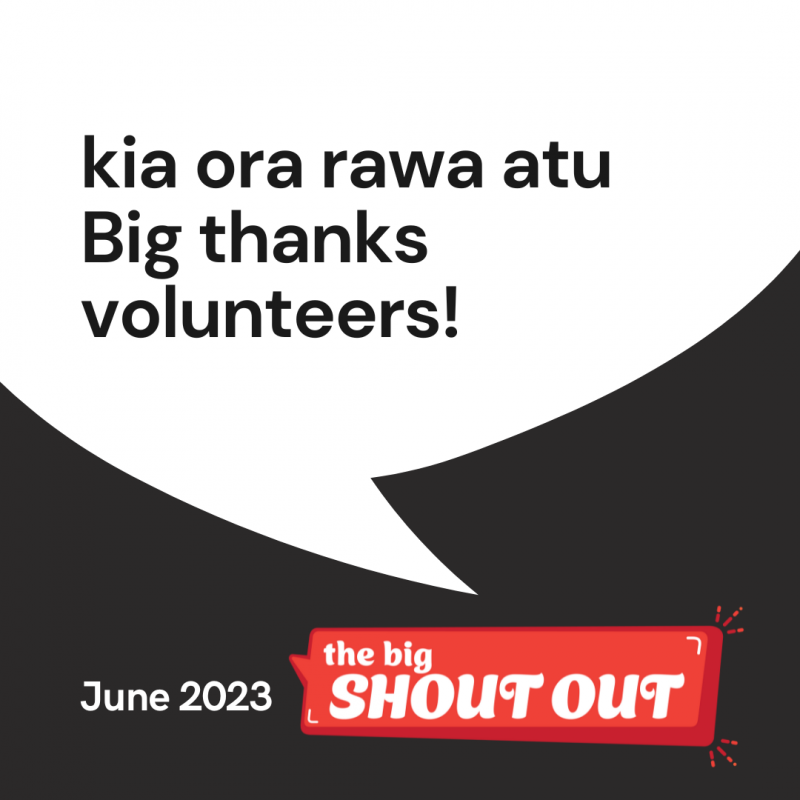
Latest News
Recognition
How to get involved in The Big Shout-out

This June we are wanting to give a #BigShoutOut to the volunteers in our community!
They are our companions, firefighters, sports team coaches, fierce advocates, environmental stewards, and so much more.
It is their time to shine, and we need your help to say thank you!
How to share stories and videos with us is detailed below. You can also access all campaign support resources for the Big Shout Out on our National Volunteer Week site.
Help us create a video

We are wanting to collate a video of community members, leaders, and organisations sharing their thanks to the volunteers who have contributed to their community.
We will take the videos you send us and edit them all together so that we can share it on our social media platforms and website, showing our appreciation of volunteers.
What we need from you:
A short video saying “Thank you” to a volunteer, or a group of volunteers who have made a difference in your life or the lives of others in your community. We would love to hear from the community itself.
The video can be as short as you would like, and no longer than 15 seconds.
You could do the video by yourself, or with a group of people!
How to film the video
- If possible, please use an I-Phone or other device with a high quality camera to film your video.
- Try to film in a space where there is minimal background noise (indoors is best, and avoid busy areas).
- If possible, film your video against a clear and uncluttered background.
- IMPORTANT: Please record your video in landscape mode.
- In your video, please say your name and what organisation you are from or represent (if applicable).

Share your stories and photos
We need your help!
We would love to hear from volunteers themselves, community leaders, and volunteer-involving organisations about some of the amazing work of our volunteer community.
Do you have a volunteer or group of volunteers you want to #ShoutOut? We want to know!
WHAT WE NEED FROM YOU:
- 1-2 stories.
- Tell us about the volunteer or volunteers you want to thank or acknowledge.
- Story text: Approx 400-600 words per story about the work and contribution of the volunteer/s.
- Photos: Profile photo of the volunteers/group shot and/or a photo of the volunteering activity.
Note: If you are wanting to acknowledge a particular individual volunteer, please make sure you have permission to tell their story and share photos with us for use on our social media.
Here's a form you can use to tell us about yourself and share the stories/ photos.

Views
Youth
In their shoes
Young people have many valuable skills to offer your organisation, and considering their desire for experiences and opportunities, can help with your volunteer recruitment.Generally speaking, youth and volunteering are often assumed to have more at odds that in common, but the two can be quite complementary with a little effort.
As not-for-profit organisations, if we can’t recruit new volunteers, then we face inevitable extinction.
We need to seriously consider how to recruit young volunteers, not only for survival, but to continue the positive impact we have on our local communities long into the future.As we approach Youth Week it is an ideal time to discuss things that you can do as an organisation to recruit new blood into your volunteer base.Go to the SourceThis does not mean that you have to start hanging out at the local skate park or stroll around the mall for hours on end talking with teenagers.
Approach high schools, universities, and other local PTE’s, make appointments to speak to the career advisors, counsellors, tutors and Gateway Programme coordinators.
These people have a role in helping students get into work experience.
Students come to them looking for opportunities, for real life work experiences, and volunteering is a great way for them to get that experience.
And organising it through the school means they may be eligible to volunteer during school hours.Short term projects lead to long-term commitmentConsider short-term group projects instead of regular ongoing roles as a way to include youth in your organisation.
Teens are naturally quite social creatures within their own peer groups, so come up with some short-term projects that a group can work on.
Do you need a wall painted?
Then talk to the art department at the high school and see if they would be interested in running a mural competition, where the winning mural is painted by the class; this builds your community connections and the winning student has a real life example of work for their portfolio.
Do you need your website updated or a promotional video created?
Talk to the media studies or graphic design classes.Build loyalty through relationshipWhen you recruit your youth volunteer, invest some time in getting to know them.
For many youth this may be their first time in a real-life work experience, so be patient, don’t micromanage them and take time to give constructive feedback.
Teenagers love it when they are treated like adults, so opt for coffee at a cool cafe and create space for both of you to provide feedback on the experience as it progresses.Including young people into your organisation is a win for both parties: You as the organisation gain a volunteer full of energy, ready to be introduced to the wide world of volunteering, they get real world experience where they can test their own theories on how the world outside of high school works.
Young people have many valuable skills to offer your organisation, they are experts at social media, could provide your team with IT training or update your website to be mobile friendly, but much more important than having a young person as a volunteer is that you are creating a volunteer for life who knows the value of giving back instead of taking from this world.
Corrine Coombe

Accessibility
Community
Latest News
Legalese unpacked
Some commonly used legal terms and what they mean in plain language
By Julie Aitken (Aspiring Law) & Steven Moe (Parry Field Lawyers&Seeds Podcast)We want to make the law more understandable for volunteers and those in for purpose organisations.
One of the barriers is that some terms used by lawyers are not commonly understood.
In this article we want to unpack these terms and provide a simple explanation as to their meaning.
We believe people would understand things more if lawyers could write contracts using plain language.While it is not common for lawyers from different law firms to work together, our mutual desire to increase understanding and make law accessible, unites us in providing these explanations.
To start we have chosen eight words:Acquitted – to go free and be judged innocent of a crime.Affidavit – a written document setting out your side of the story.
You are required to take an oath verifying the content is true.Chattel – is a personal item which you can pick up and move around.
If you buy a house a chattel could be a dishwasher, or curtains.Social Enterprise – it is a label to describe an organisation which seeks to combine both profit and a social purpose.
Such an organisation could take the form of a company, a charitable trust or limited partnership.
It is important the social purpose or impact to be achieved is clearly set out and the entity reports on that impact.
Perhaps one day there will be an actual legal entity for this concept but for now it remains a label (more on this here).Counterparts – a number of copies of the same document can be signed and combined to make the original version.
This is useful when people signing a document are in different locations.
A contract needs to have a “counterparts clause” to permit this.Indemnity – this simply means that someone will pay another person for a loss they may incur.
It’s like someone saying ‘I have your back if you do something for me and things go wrong’.
An indemnity clause is used in many contracts.
A common example is where you agree to be a committee member or trustee for a community organisation.
The club will promise to pay your costs if you are required to pay for something personally or sued for the work you have done on behalf of the organisation.
If I buy a business and there is a tax issue the person who sold the business might have agreed to cover any past tax liabilities and any losses.Freehold – this is the most common form of ownership of property in New Zealand.
You own the land and any buildings that are on it forever.
It is ‘free’ from any holds!
It doesn’t mean you are free to do whatever you want with the land but there are no limitations on the time you own the property or rent to pay.Dissolution – isn’t this a divorce? ‘Separation’ and ‘divorce’ can sometimes get confused.
A separation is when you decide to stop living together as a couple and a divorce is when the family court grants a ‘Dissolution Order’ to legally end your marriage or civil union.We hope that these simple explanations help to break down some commonly used legal terms. Let us know if you’d like more explanation or if you have other terms or concepts you would like us to consider.
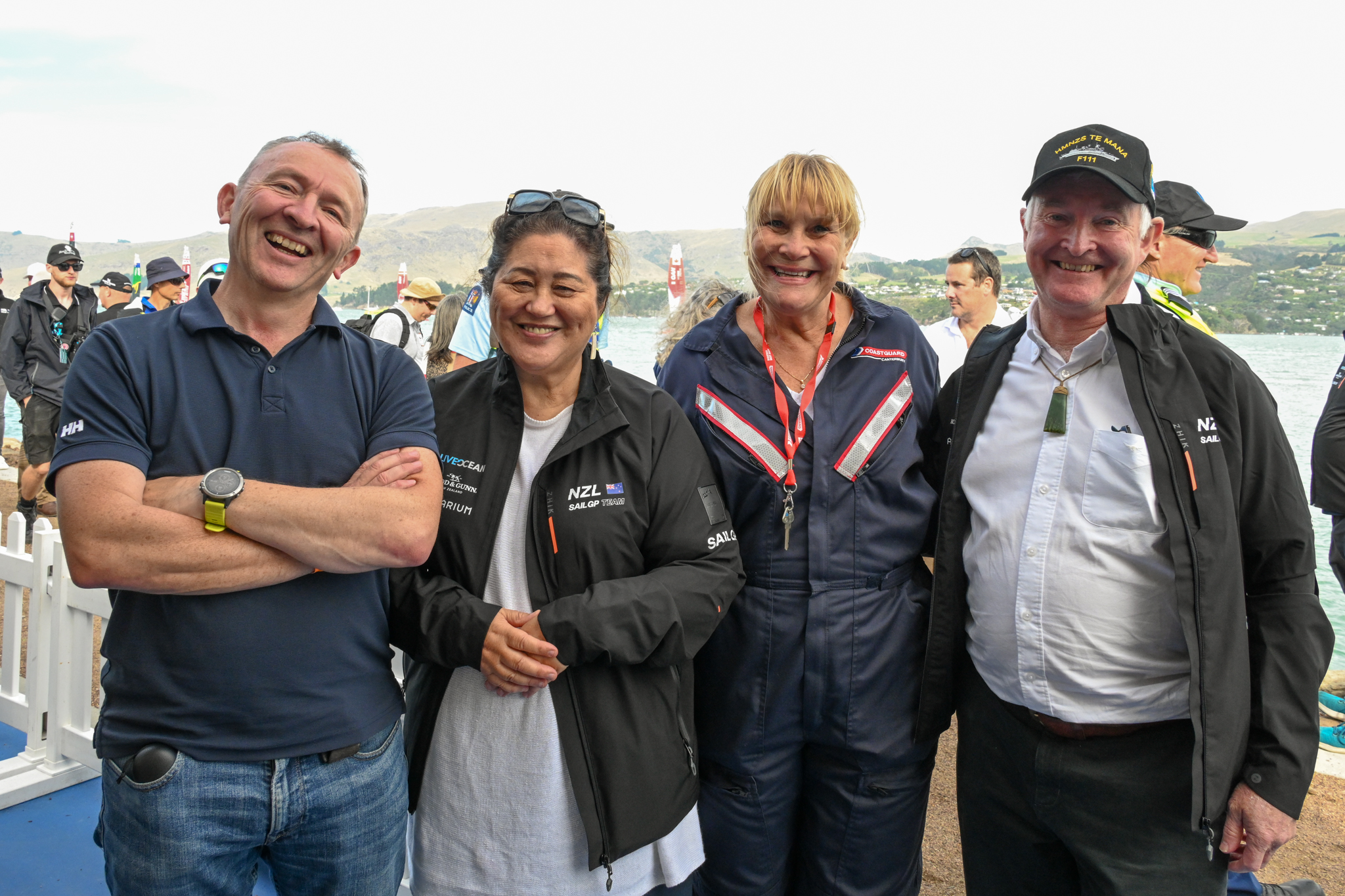
Conservation
Leadership
News
Volunteers
Volunteers vital to success of Sail Grand Prix
Like many New Zealanders and sailing fans throughout the world, on 18-19 March I watched the ITM New Zealand Sail Grand Prix on TV, proud of the kiwi sailors and the beautiful Te Whakaraupō – Lyttleton Harbour.The event was a huge win for the community, with spectators and boaties travelling from far and wide to watch.We'd like to acknowledge Carolyn Tapley who is a Board member of Volunteering New Zealand and on the Board of Coastguard Canterbury, and Coastguard New Zealand.Carolyn says, "SailGP has consumed me and Coastguard Canterbury for the last six months." She was excited to meet Governor General Dame Cindy Kiro and her husband during the event.[caption id="attachment_47395" align="alignleft" width="245"]

Callum Gillespie, CEO of Coastguard New Zealand, Dame Cindy Kiro Governor General, Carolyn Tapley, Board Member Coastguard New Zealand and Volunteering New Zealand, Dr Richard Davies, husband of Dame Cindy.[/caption]Volunteers were vital the success of SailGP.
Land-based hosts helped with the shuttle buses from the city and at the Fan Zone, welcoming spectators to the on-shore viewing site beside the harbour.Volunteers from Coastguard Canterbury, Kaikōura, North Canterbury, Sumner and West Coast played key roles in ensuring everyone was safe on the water, whatever their waka (super yachts included).The week leading up to and including the weekend for the Coastguard crew included:
- supporting course marshals during their on-water training at the start of the week
- acting as the safety boat for traditional waka involved in the official SailGP pōwhiri
- supporting the protection of the Hectors dolphin
- hosting the SailGP marshals and housing the taonga overnight
- patrolling the harbour and the Waimakariri Bar, assisting boaties and responding when required.
About 20 volunteers helped with the marine mammal programme – supporting the protection of the endangered Hectors dolphin.
These were students or others interested in wildlife who worked with scientists (aided by technology) to spot dolphins.Christine Korako who ran this programme on behalf of SailGP said it was a fantastic group who welcomed the learning opportunity and contributed to the success of the event.
The first race of the weekend was postponed due to dolphin sightings – proving the worth of the programme.Congratulations to all volunteers.
We acknowledge the commitment of time and effort this takes – unseen by worldwide TV viewers.
It takes great volunteer management to make this happen.

Research
Volunteers
Wellbeing
Volunteer wellbeing, what works and who benefits?
We know that volunteer wellbeing is a topical issue, and it should also be a central part of a volunteer's interaction within an organisation or volunteering programme. A comprehensive report in which existing literature (158 international studies about the subject of the well-being impacts of volunteering) were reviewed to explore the effects of formal volunteering on subjective well-being for different population groups and different types and levels of volunteering.
The full report is available on our research page.This research explores the relationship between volunteering and wellbeing, and the factors that can influence the wellbeing of volunteers.
The report identifies several key findings:
- Volunteering can have a positive impact on wellbeing: volunteering can have a positive impact on the wellbeing of volunteers, including improved mental health, increased life satisfaction, and increased feelings of happiness and social connectedness.
- The impact of volunteering on wellbeing can vary depending on a range of factors: including the type of volunteering activity, the level of involvement, and the individual's motivation for volunteering.
- Benefits of volunteering are not limited to the individual volunteer: the benefits of volunteering can extend beyond the individual volunteer to the wider community, including increased social cohesion and community connectedness.
- Volunteering can benefit individuals from diverse backgrounds: including those who may be socially isolated or facing disadvantage.
- Organisations can support volunteer wellbeing by providing a supportive and inclusive environment: including opportunities for skill development, recognition and appreciation, and meaningful roles and responsibilities.
Overall, the report highlights the potential for volunteering to have a positive impact on the wellbeing of individuals and communities.
The findings suggest that organisations can support volunteer wellbeing by providing opportunities for diverse and meaningful volunteering roles, creating a supportive and inclusive environment, and recognising and appreciating the contributions of volunteers.

Volunteers
Wellbeing
Five accessible resources to support volunteer wellbeing
Here are five, accessible resources/ links to support volunteer wellbeing.
1.
Te Whare Tapa Whā model of wellbeingThis holistic wellbeing model was developed by leading Māori health advocate Tā Mason Durie in 1984, describing health and wellbeing as a wharenui.
It is a metaphor based on four pillars of a wharenui/ meeting house.
When we look after all four aspects, we look after our hauora/ wellbeing.
Checking in on the four pillars helps us balance our hauora and support others to balance theirs, too.Te Whare Tapa Whā model of wellbeing
2.
Free self-help tools and apps
A list of free tools and apps you can access anytime.
Topics include:
- general wellbeing
- Cognitive Behavioural Therapy (CBT), and
- targeted support for young people.
Free self-help tools and apps
3.
The Five Ways to Wellbeing
This is a set of five simple, evidence-based actions which can improve wellbeing in everyday life.The Five Ways to Wellbeing
4.
Coping with change-related resources:
Change can be exciting, but also challenging, upsetting, and tiring, and may make maintaining your wellbeing more difficult.
It's completely normal to have an emotional reaction to change and to find some days easier or harder than others.It may also help to talk with others and share how you're feeling at this time.
- A one-page resource from the New Zealand Red Cross: Leading through change (PDF file, 1.8MB)
- This A3 poster was written for People Leaders within NZRC: Tips for building resilience through change (PDF file, 100KB)
5 Helplines and local mental health services
In the Mental Health Foundation downloadable PDF guide below you’ll also find contact details for providers with expertise in anxiety, depression, addiction, family harm, parenting and more.
Please reach out to them if you or someone you know needs support.Helplines and local mental health services (PDF, 243KB)

Community
Latest News
Leadership
Research
VNZ Events
What’s all the fuss about Volunteer Management Systems
Organisations with robust electronic systems for managing volunteers kept and engaged volunteers during the Covid years better than those without, according to the State of Volunteering Report 2022.However, how do organisations decide which Volunteer Management System to invest in, and what is their experience of implementing and using one?Our March Ako Kōtui – Networking Series 2023 session covered this topic.
Ako Kōtui are online lunchtime sessions.
Each month guests share their experience of relevant issue AND participants have an opportunity to discuss, share and network.Panel members were: Gail Marshall, co-founder Community Comms Collective; Carey Buck, volunteer coordinator for IHC Friendships Programme Wellington and Hutt Valley; and Jo Guest, contract event volunteer coordinator, Wanaka.
Heidi Quinn, Volunteer Management Lead, Volunteering New Zealand was the facilitator.
Identifying the Need for a VMS
The panellists identified ‘growing pains’ of having too many volunteers and projects to manage without better electronic systems.
If selecting a system, it was important to understand what you needed.
Gail said the Community Comms Collective had the support of a volunteer business analyst to map existing processes with the volunteer managers, identify the data requirements and then the organisation knew what it wanted in a VMS and could confidently go to market.
Jo said the look and function of a VMS was important.Heidi said if you could identify the amount of volunteer manager’s time spent co-ordinating volunteers, you could calculate the savings (in time and money) by implementing a Volunteer Management System.
Benefits to organisation and volunteers
There are many benefits both to the organisation and its volunteers from having a VMS.
Carey uses Better Impact at IHC and said she appreciated having all the information about volunteers at her fingertips.
Volunteers also had easy access to information about their interactions and could self-update.
Many systems had apps or could be accessed from a phone, making communication easy.
The Tipping Point
During the Q&A with the audience, the idea of a ‘tipping point’ for implementing a VMS was raised.
Organisations may be fine with spreadsheets or other more manual processes, but they grow to a point where better digital management is needed.
The decision to invest in a VMS can be to do with measuring volunteers’ impact and the organisation’s strategy and purpose.You can watch the panel discussion here.Here are some useful links:Advice about choosing a VMSCapterra: reviews of Volunteer Management SoftwareSoftware Advice: Volunteer Management Software

Inclusion
Leadership
Episodic volunteering - lessons we can draw from research
Episodic volunteering: review of evidenced best practice
Episodic volunteers prefer short-term, time-limited or irregular volunteering opportunities.
Therefore, episodic volunteering may be viewed as an alternative to other, more traditional forms of volunteering.Episodic volunteers tend to be time poor, and typically do not have the resources available to commit to longer-term or more regular volunteer roles.Flexibility is extremely important for episodic volunteers, both in terms of the roles performed (which should match the individual’s interests and skills) and the amount of time committed.
What does this mean for volunteer managers?
Organisational analyses have highlighted both costs and benefits associated with utilising episodic volunteers for events and in emergency situations (for example, Handy & Brudney, 2007; Volunteer Canada, 2006).
Episodic volunteers may generate fewer benefits than regular volunteers because of the training and support required, and volunteers’ wavering commitment to the organisation.However, for many organisations, episodic volunteers are essential in terms of maintaining volunteer supply.
Many benefits of utilising episodic volunteers have been identified, including:
- Building social capital within the organisation
- Increasing perceived links between the organisation and the community
- Increasing organisational capacity
- Maintenance of regular (or core) services in times of emergency or during a special event
- Utilisation of volunteers’ specialised skills and knowledge that would otherwise not be available within the organisation
- Freeing up time for essential or core staff to undertake higher-level tasks
- Building a long-term volunteer base for future endeavours (Handy & Brudney, 2007; Volunteer Canada, 2006).
From a volunteer management perspective, this involves tailoring roles according to individual preferences and providing a range of different options to choose from.
Designing episodic volunteering roles
Episodic volunteering roles should be well defined, designed specifically for short-term work and have discrete completion points.Because of the importance of flexibility, volunteering opportunities that offer options such as job sharing or flexible hours are highly attractive to episodic volunteers.Volunteer roles should be perceived as making a meaningful (rather than menial) contribution to the broader mission of the organisation.
The work should be challenging and engage the volunteer so they choose to ‘bounce back’ i.e. return to volunteer again in future.Being personally asked to take part in an episodic volunteering opportunity is an important determinant of individuals taking up that opportunity.Reasons for engaging in episodic volunteering can be both altruistic (for example, a desire to ‘make a difference’) and egoistic (for example, socialising).
Episodic volunteers who are involved for altruistic reasons are more likely to ‘bounce back’ than those involved for egoistic reasons.
Converting episodic volunteers to long term volunteers?
Management practices associated with greater retention of episodic volunteers include recognition of volunteers, offering training and professional development and screening procedures to assess suitability for the role.Retention of episodic volunteers tends to be lower for charities without the resources to support volunteers adequately.
Furthermore, volunteer satisfaction is related to both supervisor availability and the quality of service provided by management (Cnaan et al., 2017).
These factors were linked to intention to volunteer again, indicating that quality of supervision and communication by management are important predictors of episodic volunteers returning (or ‘bouncing back’).
Recommendations for episodic volunteers
Based on the research and evaluations reviewed, evidence-based recommendations for episodic volunteer programmes include:1.
Ensuring that the types of roles offered to episodic volunteers are:* Identified through consultation with key stakeholders* Engaging and meaningful* Flexible and offering a range options to potential volunteers* Clearly defined, with written position descriptions2.
Gaining a sound understanding of the motivations and preferences of episodic volunteers for the specific organisation and type of volunteering opportunity being offered3.
Ensuring the development of customised marketing communications according to motivations of volunteers and the particular volunteering opportunity available.
This is likely to vary for specific types of volunteers, such as older, one-off events and international humanitarian episodic volunteers4.
Preparing governance structures for programmes utilising episodic volunteers that include the following key elements:+ Carefully matching the specific skills, knowledge and motivations of individual volunteers with suitable volunteering roles+ Appropriate levels of training and orientation for the roles being performed, while keeping resource expenditure to a minimum+ Appropriate levels of supervision and monitoring, including providing a contact person to whom volunteers can go for guidance, and ensuring supervisors are available and communicate effectively with volunteers+ Recognising and rewarding volunteers appropriately according to the type of role they are performing+ Evaluating episodic volunteering programmes in terms of whether goals are met, but also in terms of the satisfaction of volunteers with their experience5.
Utilising a range of communication channels to inform people about opportunities for episodic volunteering, particularly using the internet and social media6.
Where possible, extending a personal invitation to past volunteers to increase bounce back for future volunteering opportunities.These insights were drawn from a recent research report, Episodic Volunteering - Rapid literature review published by the Family & Community Services, NSW Government, 2022.
It was a review of relevant literature and evidence-based recommendations regarding best practice in the governance of flexible, time-limited episodic volunteer programmes.
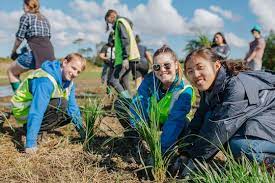
Advocacy
Conservation
Identifying, supporting and retaining environmental volunteers and leaders
By Michelle Kitney, Chief Executive of Volunteering New ZealandWhile I was at the Volunteering Australia Conference 2023 on 13-14 February, Post-Tropical Cyclone Gabrielle was wreaking havoc across the motu.One session at the conference stood out as particularly relevant.
It was on environmental volunteerism and it explored the critical role that volunteers play in conservation and addressing environmental challenges.The presentation covered research and practical strategies for volunteer leaders and co-ordinators active in the environmental sector.
Presenters included Fiona Tucker, Robyn Gulliver a researcher and Katie Ronald from Bush Heritage Australia.Activism organisations, and their volunteers typically seeks to change something, eg behaviours or laws, and often achieve this through various types of advocacy.
Despite their importance, little is known about the factors that motivate individuals to engage in different environmental volunteer activities.
Research on working with environmental volunteers and leaders
Robyn Gulliver presented research she had collaborated on in regards to activism organisations with a focus on environmentalism, and surfaced key findings from each provided an overview of three relevant studies that fed into her research.
Her presentation offered findings and takeaways for working with environmental volunteers and environmental volunteers leaders.The research found that volunteers play critical roles in leading the activities of environmental organisations seeking to address the environmental crisis.Drawing on an extended Theory of Planned Behaviour model, this study surveyed 259 experienced environmental volunteers who had participated in a range of environmental volunteer “leadership” and “participation” (i.e., non-leadership) behaviours to identify factors associated with these behaviours.Findings indicate that higher self-efficacy beliefs about specific leadership tasks, and higher past participation in participation behaviours, were significant predictors of engaging in more leadership behaviors.
Higher self-efficacy and stronger identification as an environmental volunteer also predicted increased participation behaviours, as well as a younger age.Qualitative analysis of open-ended responses highlighted the importance of organisational factors such as training opportunities and receiving support and appreciation from the group in building leaders’ self-efficacy.Finding Study 1 Reviewed how many environmental activist groups were operating across Australia.Her research found that:
- There were activist environmental groups all over the country, with a total of 3000 groups across Australia
- Many of these organisations operated without formal structure, with many groups only found on social media
- Some remained hidden, and most were not engaging in illegal actions.
- Most, if not almost all, are led by volunteers.
Finding Study 2 - Survey of environmental volunteersA survey of 195+ environment volunteers focusssed on finding out what predicts environmental volunteer behaviours.
Findings that surfaced include that:
- For participation – identification as environmental volunteers
- For leadership, belief they are capable of leadership behaviours (leadership self-efficacy)
It also explored what attracts new volunteers and sustained volunteer leaders, including:
- Social benefits – being listened to, supportive team, feeling valued and sense of belonging
- Specific traits and behaviours of volunteer leaders were important to the volunteers.
In regards to what resources volunteer leaders needed the most, it found that these factors made a difference:
- A positive social context
- Volunteers with initiative and autonomy
- More time (if they personally had time to give).
Environmental activism can often be hard to show achievements, and often the results are not as expected.
The research explored how environmental activist leaders overcome failure.
These were the tactics that worked:
- Re-evaluate success in a different category
- Emphasise individual benefits of activities to participants
- Changing tactics.
Key takeaways to Identifying, supporting and retaining environmental volunteers and leaders:
- Convey a shared identity
- Use inclusive language
- Include imagery conveying diversity
- Build in welcoming procedures/individual relationship building
- Define/support different roles suitable for different interests
- Communicate a variety of tactics
- Prioritise welcoming teams and opportunities for success.

Advocacy
Latest News
Leadership
News
Recognition
Five wins for volunteering in 2022
Have you taken stock of your achievements for the past year?Alongside the successes volunteering brings to people and organisations, Volunteering New Zealand advocates for nationwide goals to improve volunteering for all.
Before 2023 accelerates much faster, we’d like to share five wins for volunteering for 2022.1.
One in two people volunteer, and we’re doing more hours than before.
In 2021, 50.7 percent of people had volunteered in the previous month (a 0.9% increase from 2016).
This includes people who volunteer for an organization, and those who volunteer directly for another person.
Total volunteering equates to 9 million hours a week!
This data comes from Statistics New Zealand’s General Social Survey, issued in September 2022, from population representative diary entries.2.
Volunteers rate the state of volunteering in 2022 as almost the same as pre-Covid (6.7 out of 10), and over 80% intend to continue volunteering long-term.
Their primary motivation is to contribute to their communities.
Volunteering New Zealand’s State of Volunteering report for 2022 shows the state of volunteering is generally in good health!3.
A cross-government group on supporting and strengthening volunteering has been formed, as an outcome of the DIA’s Strengthening our Approach to Volunteering It recognizes the need for a more strategic approach to volunteering across 30 government agencies, and the role of government in supporting volunteering role and infrastructure.
The group, which includes Volunteering New Zealand Chief Executive Michelle Kitney, has agreed to focus on reducing the compliance burden for volunteer organisations and investment in volunteering infrastructure and diversity.4.
Volunteers and volunteer managers will have better access to training, because of the Vocational Education Reforms.
Volunteers can now access funded vocational training – a change Volunteering New Zealand advocated for in 2019.
The formation of six new Workforce Development Councils / Ohu Mahi provide an opportunity for new qualifications relevant to managing volunteers.
Volunteering New Zealand is discussing what these could look like with two of the Councils.5.
Volunteers’ contribution to the wellbeing of New Zealand is now being measured and valued.
The Government’s Living Standard Framework now includes indicators of volunteering – including participation in volunteering and informal volunteering by young people.Woop, woop!
Looking forward to what we can achieve together with the sector in 2023!

Advocacy
Latest News
Research
VNZ Events
VNZ in the News
Community Sector Engagement Group meeting
The Community Sector Engagement Group met with the Hon Priyanca Radhakrishnan, Minister for the Community and Voluntary Sector, on 10 November 2022.Volunteering New Zealand is a representative on this sector engagement group, which meets regularly with our Minister for the Community and Voluntary Sector.
- The Minister acknowledged that the sector had another hard year as we continue to respond to the impacts of COVID-19.
- She thanked participants for their hard and on-going work.
- The Minster noted the Social Cohesion work being led out by MSD and the sector’s connection to this work and framework and asked the group to put forward what would be useful for the community sector and how the Government can support their work in social cohesion.
- The Minister is keen to receive feedback from the community organisations on the Charities Amendment Bill and the submissions have been extended to 9 Dec 2022.
- A cross government group on volunteering is now meeting regularly, as an outcome of the Strengthening our Approach to Volunteering Report.
- Michelle Kitney, Chief Executive of Volunteering New Zealand has been invited to join this group, and has attended her first meeting.
- The group has collectively agreed to focus on two top priorities: i) Reducing the compliance burden for volunteer organisations ii) investment in volunteering infrastructure and diversity.
- All participants shared resources in terms of how they incorporate Kaupapa Māori Frameworks into their organisations.
- The Group agreed that, while COVID-19 had been the catalyst for the establishment of the Minister’s Community Sector Engagement Group, there was value in continuing to meet next year.
The next meeting of the group will be in early 2023.
Please email Michelle Kitney - michelle@volunteeringnz.org.nz with any thoughts or ideas to contribute to this meeting.
